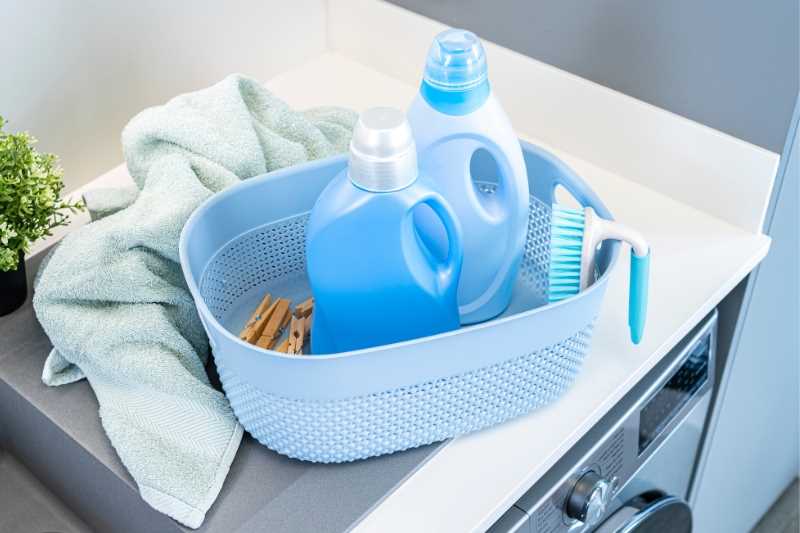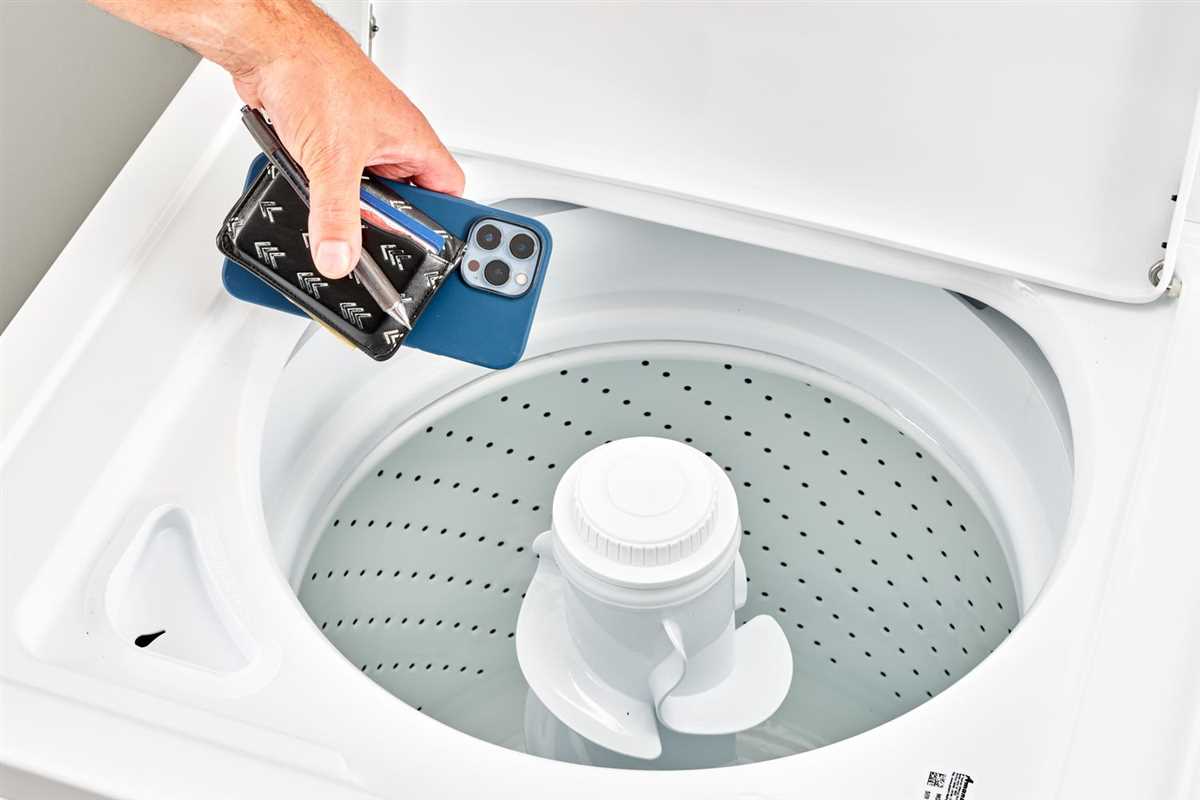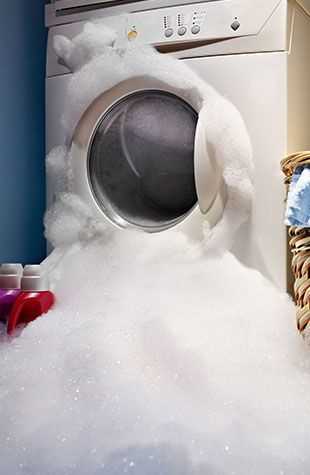


Fabric softener is a popular laundry product that many people use to make their clothes feel softer and smell fresher. However, using too much fabric softener can have negative effects on your clothes, washing machine, and the environment.
One of the main consequences of overusing fabric softener is that it can leave a residue on your clothes. This residue can make your clothes feel stiff and can even cause them to become less absorbent. Additionally, overusing fabric softener can also leave stains on your clothes, particularly if you are using a liquid fabric softener that contains dyes or perfumes.
Overusing fabric softener can also have a negative impact on your washing machine. The excess softener can build up in the machine, leading to clogs and decreased performance. This can result in your washing machine needing more frequent repairs or even needing to be replaced sooner than expected.
Finally, overusing fabric softener is not only bad for your clothes and washing machine, but it is also bad for the environment. Fabric softeners typically contain chemicals that can be harmful to aquatic life if they end up in rivers or oceans. Additionally, fabric softener bottles and packaging are often made from non-recyclable materials, adding to the problem of waste and pollution.
In conclusion, while fabric softener can be a great addition to your laundry routine, it is important to use it in moderation. Overusing fabric softener can lead to problems such as stiff clothes, stains, clogs in your washing machine, and harm to the environment. It is best to follow the recommended usage guidelines on the fabric softener packaging to avoid these issues and keep your clothes and washing machine in good condition.
Effects of Overusing Fabric Softener
If you overuse fabric softener, it can have a number of negative effects on your clothing, washing machine, and the environment. Here are some potential consequences:
- Residue build-up: Overusing fabric softener can lead to a build-up of residue on your clothing. This can make them feel sticky and less absorbent, and may even cause them to become less durable over time.
- Reduced absorbency: Fabric softener can coat the fibers of your clothing, making them less absorbent. This can be a problem if you have towels or other items that need to effectively absorb moisture.
- Stain repellency: The softening agents in fabric softener can create a barrier on your clothing, making it more resistant to absorbing stains. While this may sound like a good thing, it can actually make it harder to remove stains during the washing process.
- Build-up in washing machine: If fabric softener is overused, it can build up in your washing machine. This can lead to clogs and reduce the efficiency and lifespan of your machine.
- Environmental impact: Fabric softeners typically contain chemicals that can be harmful to the environment. When overused, these chemicals can end up in waterways, causing pollution and potentially harming aquatic life.
To avoid these negative effects, it is important to follow the recommended usage guidelines for fabric softener. Additionally, you may consider alternatives to fabric softener, such as vinegar or dryer balls, which can provide similar benefits without the potential drawbacks.
Damages to Fabrics
Overusing fabric softener can lead to several damaging effects on fabrics, which may include:
- Build-up of Residue: Fabric softener leaves a thin layer of chemicals on the surface of fabrics to make them feel softer. Over time, frequent use of fabric softener can lead to a build-up of this residue, causing fabrics to become less absorbent. This can affect the performance of towels, washcloths, and other absorbent fabrics.
- Stains and Discoloration: Some fabric softeners contain dyes or oils that can transfer onto fabrics, resulting in stains or discoloration. This is particularly common in lighter-colored fabrics or delicate materials.
- Decreased Breathability: Fabric softeners can coat the fibers of fabrics, reducing their ability to breathe. This can result in fabrics feeling less breathable and may cause discomfort, especially in warm weather or during physical activity.
- Reduced Absorbency: As mentioned earlier, the build-up of fabric softener residue can impair the absorbency of fabrics. This can be problematic for items like bath towels, kitchen towels, or cloth diapers that need to effectively soak up liquids.
- Decreased Fabric Lifespan: Over time, the chemicals in fabric softeners can break down the fibers of fabrics, leading to premature wear and tear. Fabrics that are overexposed to fabric softeners may become weak, thin, or develop holes more easily.
To prevent these damages, it is important to follow the recommended usage instructions for fabric softeners and avoid excessive or frequent application. It is also recommended to choose fabric softeners that are free from dyes and oils, particularly for delicate fabrics.
Allergies and Skin Irritations
Overusing fabric softener can lead to allergies and skin irritations. Fabric softeners often contain chemicals that can be harsh on sensitive skin. These chemicals can cause allergic reactions, such as itching, redness, and rashes.
One specific ingredient that can cause allergies is fragrance. Many fabric softeners contain synthetic fragrances, which are known to trigger allergic reactions in some people. These reactions can range from mild to severe, depending on the individual’s sensitivity.
Additionally, fabric softeners may leave residue on clothing, especially if used in excessive amounts. This residue can come into contact with the skin and irritate it, causing discomfort and redness. People with sensitive skin are more prone to experiencing these skin irritations.
It’s also important to note that fabric softeners can interact with other products, such as laundry detergents or skin care products, and worsen their effects. For example, if a person is already using a strong detergent that irritates their skin, adding fabric softener to the laundry routine can exacerbate the irritation.
If you notice any signs of allergies or skin irritations after using fabric softener, it’s recommended to discontinue its use and consult a dermatologist. They can provide proper diagnosis and advice on how to care for sensitive skin.
In conclusion, overuse of fabric softener can lead to allergies and skin irritations, especially in individuals with sensitive skin. It’s important to use fabric softener in moderation and be mindful of any reactions that may occur.
Increased Environmental Impact
Overusing fabric softener can have a negative impact on the environment. Here are some ways in which it can contribute to increased environmental impact:
-
Water Pollution: Fabric softener contains chemicals that are not easily biodegradable. When excess fabric softener is used and washed away, these chemicals can end up in water bodies like rivers and lakes, leading to water pollution.
-
Disruption of Aquatic Life: The chemicals present in fabric softener can be harmful to aquatic organisms. When released into water bodies, they can disrupt the delicate balance of ecosystems, affecting plants, fish, and other aquatic life.
-
Energy Consumption: Overusing fabric softener means using more detergent in each wash cycle. This can lead to increased energy consumption as the washing machine needs to work harder and use more electricity to clean the clothes.
-
Packaging Waste: Fabric softener often comes in plastic bottles which contribute to plastic waste when not properly recycled. Overusing fabric softener means more empty bottles that may end up in landfills or as litter in the environment.
-
Production and Transportation Emissions: The production and transportation of fabric softener contribute to greenhouse gas emissions. Overusing fabric softener means more demand for its production and transportation, further adding to these emissions.
To reduce the environmental impact of fabric softener usage, it is recommended to follow the manufacturer’s instructions for the correct amount to use. Additionally, considering alternative eco-friendly fabric softeners or natural alternatives like white vinegar can also help minimize the environmental footprint.
Build-up in Washing Machines

Overusing fabric softener can lead to build-up in washing machines, which can cause a number of issues. When fabric softener is used excessively, it can leave a residue on the drum, agitator, and other parts of the machine.
This build-up can affect the performance of the washing machine and lead to various problems:
- Reduced cleaning efficiency: The residue left by fabric softener can trap dirt and detergent, preventing them from being properly rinsed out of clothes. This can result in clothes not being cleaned as effectively as they should be.
- Odor: Over time, the build-up of fabric softener can start to emit a foul odor. This unpleasant smell can transfer to the clothes being washed, making them smell less fresh.
- Mold and mildew growth: The build-up can create a moist and sticky environment, which is an ideal breeding ground for mold and mildew. This can lead to the growth of these fungi inside the washing machine, causing additional odors and potential health risks.
- Staining: The residue from fabric softener can leave stains on clothes, especially if it’s not rinsed out properly. These stains can be difficult to remove and may require additional washing cycles or special treatments.
- Mechanical damage: The build-up can also affect the moving parts of the washing machine, such as the drum and agitator. Over time, this can lead to mechanical issues and reduce the lifespan of the appliance.
To prevent build-up in the washing machine, it is important to use fabric softener in moderation and follow the recommended dosage instructions on the product packaging. It is also recommended to periodically clean the machine, including the drum, agitator, and other parts, to remove any build-up that may have occurred.
Expense and Overuse

Using fabric softener excessively can not only lead to negative effects on your clothes and washing machine, but it can also be expensive in the long run. Here are some ways in which overusing fabric softener can affect your expenses:
Deterioration of Clothes
- Reduced lifespan: Overusing fabric softener can cause a buildup of the product on your clothes, which can make them feel stiff and reduce their absorbency. This can lead to faster wear and tear, resulting in the need for more frequent clothing replacements.
- Colour fading: Fabric softeners can contain chemicals that can fade the color of your clothes over time, especially if used excessively. This can make your clothes look dull and worn out, requiring you to replace them sooner than expected.
Increased Washing Machine Maintenance
- Residue buildup: Overusing fabric softener can cause a residue buildup in your washing machine. This can clog the nozzles, pipes, and drainage system, leading to reduced machine performance and efficiency. It may result in the need for professional cleaning or even the replacement of parts, which can be costly.
- Water consumption: Using excess fabric softener requires longer rinsing cycles to remove the residue effectively. This can lead to increased water consumption, resulting in higher water bills.
Financial Costs

- Higher detergent consumption: When fabric softener is overused, more detergent might be required to effectively clean your clothes. This can increase the amount of detergent you need to buy, leading to extra expenses.
- Increased fabric softener usage: Over time, you may find yourself needing to purchase fabric softener more frequently if you are overusing it. This can add up to your monthly expenses, especially if you use high-quality or expensive fabric softeners.
Overall, overusing fabric softener can have a negative impact on both the condition of your clothes and the performance of your washing machine. It can also result in higher expenses due to increased clothing replacement, washing machine maintenance, and additional costs for detergent and fabric softener. It is important to follow the recommended usage guidelines to avoid these issues and save money in the long run.
FAQ
What happens if I use too much fabric softener?
If you use too much fabric softener, it can leave a residue on your clothes that can make them feel stiff and greasy. Additionally, excessive fabric softener can reduce the absorbency of towels and cause them to become less effective at drying.
Can using too much fabric softener cause skin irritation?
Yes, using too much fabric softener can cause skin irritation. Fabric softeners can contain chemicals that may irritate sensitive skin, especially if they are not properly rinsed out of the fabric. It is important to follow the recommended usage instructions and consider using fragrance-free options if you have sensitive skin.
Is using fabric softener bad for the environment?
Using fabric softener can have a negative impact on the environment. Many fabric softeners contain chemicals that are not biodegradable and can contribute to water pollution. Additionally, some fabric softeners contain ingredients that are derived from petroleum, which is a non-renewable resource. If you are concerned about the environmental impact, you may want to consider alternative eco-friendly options or reducing your use of fabric softener.
Can fabric softener affect the performance of athletic wear?
Yes, fabric softener can affect the performance of athletic wear. Many athletic clothes are designed with moisture-wicking properties to keep you dry during physical activity. Using fabric softener can create a barrier on the fabric, reducing its ability to wick away moisture. This can result in sweat being trapped against your skin, causing discomfort and potentially increasing the risk of odour and bacteria buildup.
Can using too much fabric softener damage my washing machine?
Using too much fabric softener can potentially damage your washing machine. Excessive fabric softener can build up in the machine’s dispenser drawer or clog the fabric softener dispenser, affecting its functionality. Additionally, the residue left by fabric softener can attract lint and other debris, leading to clogs and reduced performance of the machine over time. It is important to use the recommended amount of fabric softener and clean your machine regularly to prevent potential damage.
What are the possible side effects of overusing fabric softener?
Overusing fabric softener can lead to a buildup of residue on clothing, which can make them feel stiff or greasy. It can also cause irritation and allergic reactions in people with sensitive skin.












